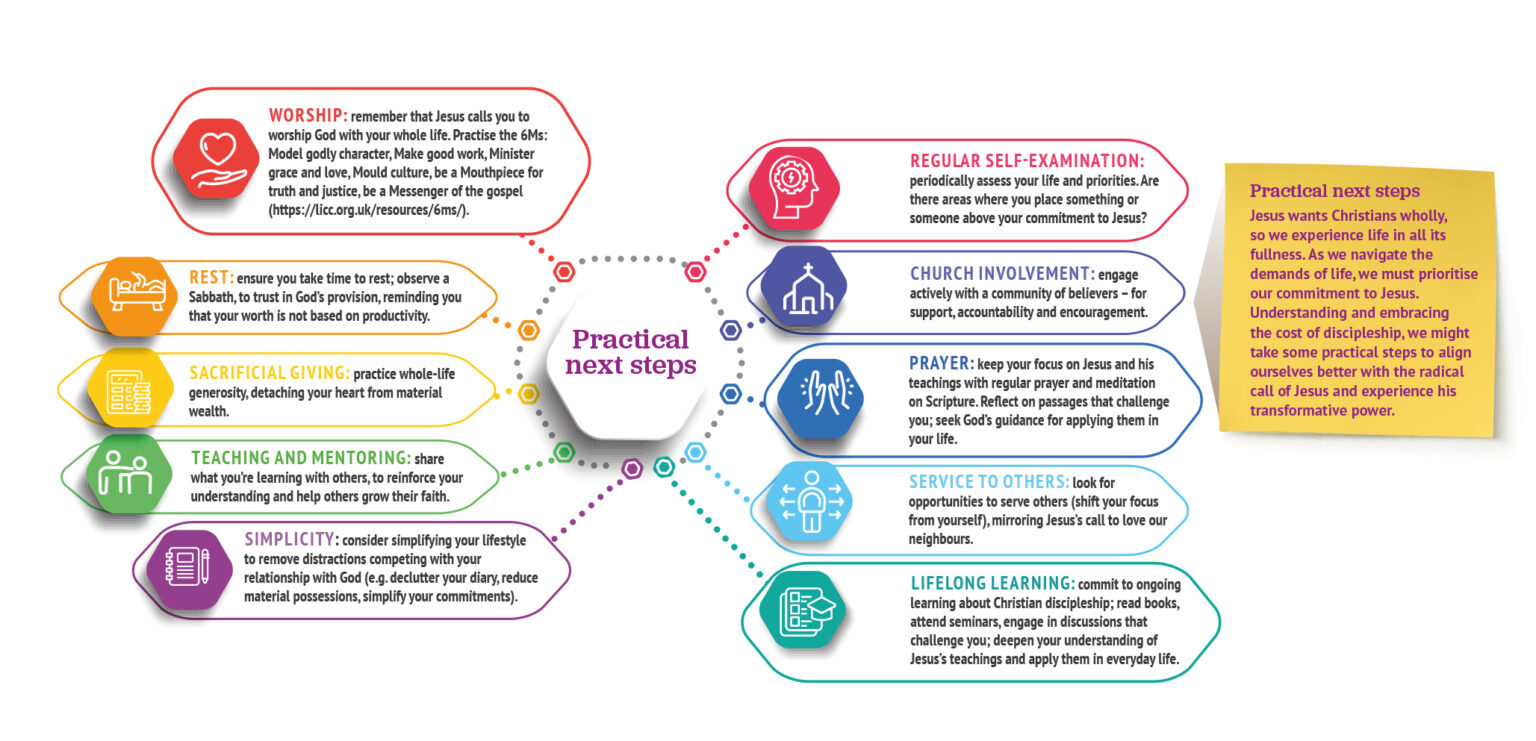Focussing on Jesus’s teaching to ‘hate family’, Paul Woolley explores the difficult sayings of Jesus that call for total commitment.
This article was published in the September to December 2024 edition of Rapport magazine.

You won’t have heard of my current favourite theologian before. He’s never written a book. He can only write his name – Otis Woolley. He’s just started school, and he’s my son. Why is he my favourite theologian? First, he thinks and talks about God. ‘Theology’ stems from Greek – ‘God’ (theos) and ‘word’ (logos). If we think, talk or write about God, the world, ourselves and their interrelationships, we are theologians. Otis does that all the time. Secondly, Otis asks great questions, ones that we adults often avoid. Faced with a difficult saying or teaching of Jesus, Otis asks, ‘Did Jesus really mean that?’ and ‘Is he serious?’
The elephant in the room
Sometimes a speaker or writer seems to address everything about a passage from Scripture except the particularly surprising or difficult part. We need to focus on the hard sayings of Jesus that we are all aware of but rarely discuss, because if we are seeking to follow Jesus, we should take seriously everything he said. Jesus’s teachings challenge our priorities, urging us to place God first despite the cost, in order to experience true discipleship and life in all its fulness.
We typically respond to Jesus’s hard teachings in one of two ways. We can think Jesus couldn’t possibly have meant what he seems to be saying and ignore him. Or we think that we can’t possibly accept what Jesus is saying and ignore him. But ignoring Jesus is not an option if we are serious about following him. It is nonsense to call Jesus ‘Lord’ and not do what he says.
Five hard teachings of Jesus:
- Let the dead bury the dead (Matt. 8:22; Luke 9:60)
- Whoever divorces and marries another commits adultery (Matt. 5:27–32;
Mark 10:11–12; Luke 16:18) - You must be perfect (Matt. 5:48)
- Sell what you have (Matt. 19:21; Mark 10:17–22; Luke 18:22)
- Let him who has no sword buy one (Luke 22:36)
Jesus-followers should ask:
- What did Jesus mean?
- How should we respond today?
Hate your family
Jesus spoke sobering words that appear to tell people to hate their family:
[Jesus] said: ‘If anyone comes to me and does not hate father and mother, wife and children, brothers and sisters – yes, even their own life – such a person cannot be my disciple. And whoever does not carry their cross and follow me cannot be my disciple.’
Luke 14:25–27
Jesus seems to say that loving your family is incompatible with following him.
Firstly, Jesus’s teaching contradicts our innate sense of what is good. This teaching runs counter to nearly every culture’s basic values. Families should love each other and look after each other and it’s painful when relationships break down.
Secondly, Jesus’s words seem to contradict God’s law. The fifth commandment says, ‘Honour your father and mother’ (Ex. 20:12). It’s the only one that includes a promise: ‘that you may live long in the land God is giving you.’
Thirdly, this teaching seems to contradict Jesus’s own words and practice elsewhere. When asked how to get eternal life, Jesus says, ‘honour your father and mother,’ and ‘love your neighbour as yourself’ (Matt. 19:19). According to John, Jesus reached down in love for his own mother from the cross (John 19:26–27).
In John’s first letter we read, ‘Whoever claims to love God yet hates a brother or sister is a liar. For whoever does not love their brother and sister, whom they have seen, cannot love God, whom they have not seen’ (1 John 4:20).
Robert MacIntyre’s story behind his first Professional Golf Association title in June 2024 was about breaking through after having struggled with loneliness while travelling and playing such a competitive sport. Understanding that family is a gift, he called on his dad for help as his caddie. MacIntyre said: ‘I wanted to win this for my dad … who taught me the game … I have done this with him on the bag.’
So, did Jesus mean love our family or hate them?
Understanding the context
In Jesus’s first century world, rabbis often used sharp contrast and exaggeration to grab people’s attention. This still happens today: ‘If you don’t do your homework, you can kiss your future goodbye!’ That’s not literally true. ‘Your bedroom looks like a pigsty!’ That’s unlikely.
I’ve heard a teacher say: ‘If your child misses just one day of school, their education will suffer, and they will never be able to catch up.’ The teacher was trying to grab attention and drive home a point.
Jesus isn’t demanding literal hatred of family but his teaching should still be taken seriously. He is using deliberately strong language, exaggerated imagery, to illustrate the cost of following him, reminding us that everything is at stake. Jesus also said, ‘If your right eye causes you to stumble, gouge it out and throw it away’ (Matt. 5:29). He didn’t mean this literally but was emphasising the seriousness of sin and the need for radical action against it.
When saying ‘hate your family’, Jesus exaggerates to challenge our comfortable world. God’s claim is above all others, demanding our ultimate commitment. If this clashes with any other allegiance, including family, then that must give way. There will be rivals warring for supremacy over the throne of our hearts, but our love for Jesus must defeat every one. We must ‘seek first [God’s] kingdom …’ (Matt 6:33). Jesus isn’t advocating hatred as we understand it but rather, urging full commitment to him.
How should we respond?
Does following Jesus always uproot us from family? Certainly, for those who first heard his call, it did. Jesus’s own brothers and sisters thought him bonkers at times (Mark 3:21).
It is important to acknowledge that following Jesus may not make life easier. Our troubles may be just beginning when we decide to follow Jesus – one of my friends was disowned by his parents. But for most of us, following Jesus involves a call back into the family rather than detachment from it. We can truly love our family through our love for Christ. For example: I realised one evening that I loved my work more than my family, when I was answering emails whilst bathing the children. This was neither good nor safe. I was showing them my work was more important to me than being present with them.
So, what might be taking our supreme loyalty?
- Family? We must avoid idolising family, putting it before everything else. Children are an important gift but they are not the centre of the universe.
- Work? God wants us to be fruitful and work is part of God’s mission in the world, but we must avoid idolising it. Work is part of our worship, but should not be worshipped.
- Money? It is a gift from God. It matters. But we must avoid prioritising money over God.
- Nation? I love my country but I must never place that above love for God.
Jesus challenges us to put things in their proper place. Loyalty to Jesus outranks everything. Put God first and the rest falls into place. I am increasingly convinced that the cost of following Jesus is nothing compared with the cost of not following him. Dallas Willard described life without Jesus as life ‘without abiding peace, a life penetrated throughout by love, faith that sees everything in the light of God’s overriding governance for good, hopefulness that stands firm in the most discouraging of circumstances, power to do what is right and withstand the forces of evil’ (The Spirit of the disciplines, 1999, my emphasis). I can’t imagine living without Jesus. I am simply not strong enough.
Jesus’s challenge to his disciples (ancient and modern) is to live in a way that reflects our ultimate commitment to him: ‘Jesus, all for Jesus. All I am and have and ever hope to be.’ (Robin Mark, 1990)


Paul Woolley is CEO at the London Institute for Contemporary Christianity (LICC). Paul’s on a mission to embed the whole-life discipleship ‘gene’ into the culture of the UK church within a generation. He is regularly a commentator in the media, has a monthly column in Christianity magazine, and is co-host of The Whole Life Podcast.
Explore this further at Lee Abbey Devon
Join Paul Woolley and Steve Rouse from LICC for
Walking in his steps
11–15 November 2024 (Mon–Fri)
Imagine walking in the footsteps of Jesus’s disciples, with a mission to make disciples, just as he did. This is the call of Jesus, but many of us haven’t had the experience of either being discipled or discipling others in this way. Join us for a week-long journey with the dedicated team from LICC. Rediscover what it means to be a whole-life disciple of Jesus and how this can transform us and the world around us. It’s a week that will inspire and equip you to live life with Jesus in every aspect, every day. This week is suitable for everyone, especially those in any position of leadership in the church.
